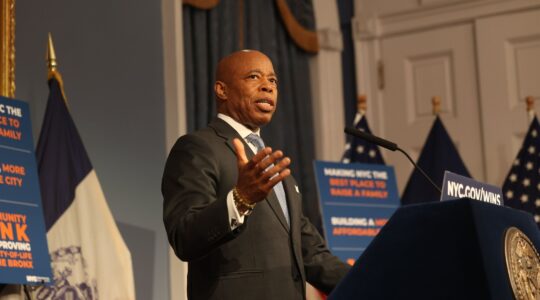The election of Ehud Barak as Labor Party leader Tuesday and the expected change in the Israeli cabinet are seen as unlikely to change Israel’s decision to refrain from intervening as Hamas appeared on the verge of crushing the forces of its rival Fatah Party in the Gaza Strip.
But feuds between different Palestinian clans and tribes in Gaza are likely to continue, according to Mordechai Kedar, an expert on Arab affairs at the Begin-Sadat Center for Strategic Affairs.
“The division between families pretty soon will work against Hamas,” he said. “Any government — even if it be a government of angels from heaven — will not be able to control this chaos.”
Kedar, who predicted this scenario two years ago in a position paper for the Israeli government, said there would now be two Palestinian entities — one in the Gaza Strip controlled by Hamas and the other in the West Bank controlled by Fatah. The Fatah leader, Palestinian President Mahmoud Abbas, may now try to negotiate with Israel for statehood for the fewer than 2 million Palestinians who live in the West Bank, he said.
The civil war in Gaza came as the Israeli Knesset elected former Israeli Prime Minister Shimon Peres, 83, the former Nobel Prize laureate and protégé of David Ben-Gurion, as Israel’s next president. “It’s good for the country,” observed Gerald Steinberg, a political science professor at Bar-Ilan University. “Peres is the symbol of Zionism who is considered to be the voice of Israel and is very popular internationally. He will repair a lot of the damage [Israel has sustained globally] over the last 10 years. He is not corrupt and even though people may have disagreed with the way he has done things, his heart has been in the right place.”
Peres was elected after his two challengers (Reuven Rivlin and Colette Avital) withdrew from the race after Peres received 58 votes — three shy of a victory — in the first round of voting Wednesday. It was Peres’ first victory following decades of electoral defeats, most recently seven years ago when he lost his quest for the presidency to Moshe Katsav.
Katsav has suspended himself after accusations of rape and sexual assault. His predecessor, Ezer Weitzman, was forced from office prematurely after it was found he had accepted more than $450,000 in illegal bribes.
Peres’ election is seen as good for Israeli Prime Minister Ehud Olmert because he was seen by some as a possible replacement for Olmert should leaders of the Kadima Party seek to oust Olmert over his handling of last summer’s inconclusive war against Hezbollah, according to Gideon Rahat, a lecturer in political science at the Hebrew University of Jerusalem.
Although Barak promised during the campaign for party leader that he would join Olmert’s government only if Olmert set a date for new elections, Rahat predicted that Barak would not now insist on it.
“Barak needs time to build his candidacy for prime minister,” he explained. “I don’t see him running to have new elections when [former Prime Minister Benjamin] Netanyahu is so strong in the polls.”
The next important milestone in Israeli politics, Rahat said, will be the release of the final report on last summer’s war by the Winograd Committee. In its interim report, the committee was harshly critical of Olmert’s handling of the war and observers are waiting to see if Olmert can survive the repercussions that are bound to arise from the final report.
Steinberg said Barak will also be closely watched to see if he has changed since he served as prime minister from 1999 to 2001.
“When he was prime minister, it was him and three or four people from the army who ran the country,” he recalled. “One by one his coalition partners left him, and he dug in instead of understanding the problem of a narrow government.”
Before he came to Camp David for talks with Palestinian President Yasir Arafat in July 2000, Barak had a one-vote plurality in the Knesset.
Although Steinberg said he does not expect any changes in Israel’s hands-off policy with Gaza, “Barak has to do something to show he is there and that there is a different era” after that of former Labor Party leader Amir Peretz, who served as defense minister.
Steinberg said there were calls by some in Europe for Israel to help Fatah by releasing Palestinian prisoners, supplying it with weapons and releasing tax money it has collected for the Palestinian Authority. Israel refused, but Steinberg said that no matter what Israel could have done, there was no way to have saved Fatah from destruction in the Gaza Strip. “It was too corrupt and alienated from the population,” he said. “People who are corrupted don’t have the ability to fight for power. The question is whether Hamas will be able to impose some sort of order or whether Gaza will be divided up by gangs — whether there will be a government or a war of attrition.”
More than 50 Palestinians — most of them gunmen — were killed by midweek in five days of fighting in Gaza and civilians remained in their homes to stay out of the line of fire.
Nidal Abu Shwiyeh, who was returning to Gaza Wednesday with his elderly father after obtaining medical treatment for him in Israel, said he had heard that gunmen had surrounded his home in Jabalya and that his family had huddled beneath the staircase to escape the shooting.
“I blame the political leadership of both groups,” he said. “If the political leaders can’t control the militias, they should resign.”
Shwiyeh said he was forced to return to Gaza because the Israeli permit he had obtained was only good for his father’s medical treatment. He spoke with The Jewish Week at the Erez crossing at the northern end of the Gaza Strip that is reserved for VIPs, businessmen and those with medical emergencies.
Shwiyeh was driven to the crossing by a relative who lives near Tel Aviv, Mohammad Abu Mousa.
“Why are the factions fighting each other?” he asked. “I’m worried about all of the people inside Gaza.”
A man coming out of the Gaza Strip, Teiysir Eawab, a businessman from Gaza City, said the taxi he was in was stopped repeatedly on his trip to the crossing at perhaps 200 checkpoints manned by either Hamas or Fatah gunmen.
“I’m lucky that I’m neither Hamas nor Fatah because when they find someone affiliated with either group, the person is shot,” he said. “I’m safe because I’m an independent. The people are the victims of this fight.”
Israel correspondent Joshua Mitnick contributed to this report.
The New York Jewish Week brings you the stories behind the headlines, keeping you connected to Jewish life in New York. Help sustain the reporting you trust by donating today.




